Hatch Day for Chicks: What to Expect and How to Troubleshoot
Are you nervous about hatch day with your chicks? Discover what the hatching process looks like and learn how to deal with the unexpected.
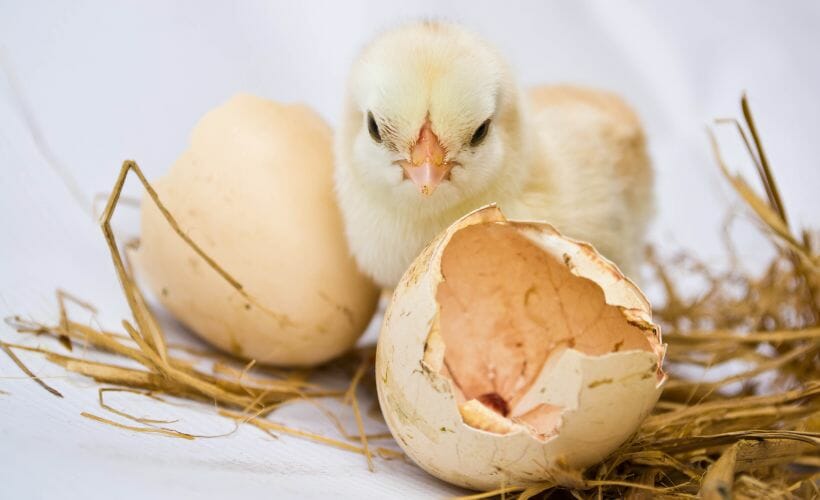
It’s the day we’ve all been waiting for: Hatch Day! For twenty-one days, you’ve been peeking and listening. You’ve had chicks on the brain. Now you finally get to see those fluffy faces. So what can you expect? What does a successful hatch look like? When should you intervene? How do you troubleshoot what might have gone wrong?
If you are hatching ducklings or quail, their requirements are a bit different. Check out my posts, How to Achieve High Hatch Rates with Duck Eggs in Your Incubator, for duckling-specific information, and How to Incubate Quail Eggs & Brood Quail Chicks Like a Pro, for information on hatching quail.
What to Expect During the Hatching Process
First and foremost, 21 days of incubation are not definite. Please do not start panicking when day twenty-one comes along and nothing has happened. More harm comes from over-eager hatchers than from chicks dying from getting stuck. The chick will decide on its own timetable when it should come.
If you haven’t done it yet, make sure your brooder is set up and you’re in lockdown mode.
Pipping, Zipping & Chick Hatching
On hatch day or the days leading up to it, the chick will peck with its egg tooth, located on the end of its beak, until it breaks through the inner membrane (the part that separates the air cell from the chick). This is the gap you’ve seen when you’re candling the eggs. This is called internal pipping. At this time, you might hear them cheeping away.
After that, the chick will make a small hole in the outside of the egg. This hole is called the external pip. Many chicks take a long break at this point, so don’t worry if the egg stops rocking, chirping, and/or progressing.
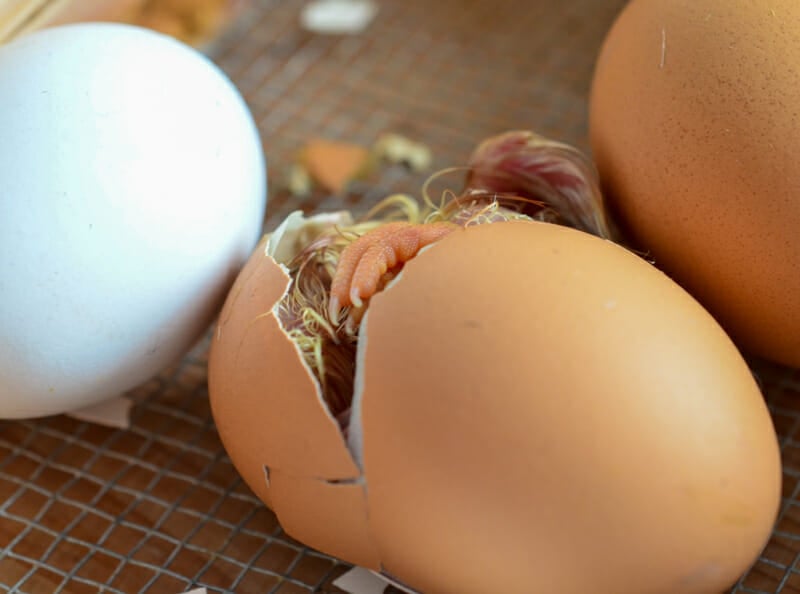
Once it has dozed a bit, the chick will start to unzip the egg. Moving in a circle, they will create a little line in the egg until enough has separated that they can push themselves out. Then you are blessed with a hideously ugly, wet, and nearly bald chick.
Not what you were expecting? That’s okay! In an hour or two, it will be the cute, fluffy chick you’ve been imagining.
Removing Hatched Chicks
Some words of wisdom: Do not open the incubator to remove chicks unless you are dealing with one of two things. Either all of the chicks have hatched and are fluffy, or it has been 48 hours since the first chick hatched. In that case, grab out all the chicks that are dry and fluffy, and then close the lid quickly.
If an unhatched egg has pipped internally, it can get trapped due to the decrease in humidity, which happens quickly.
Intervening in a Hatch
If you feel you must intervene at some point in the hatching process, please read this very helpful post from Backyard Chickens. The author not only tells you when to assist and when to wait, but she also has a great guide on how to assist and give your chick the best odds.
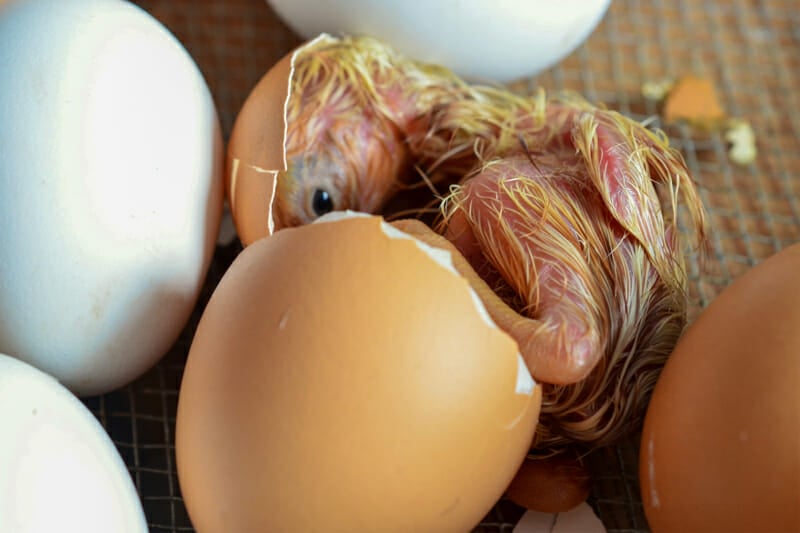
I recommend reading before starting a hatch so you are prepared for the worst-case scenario. Please be forewarned that some photos may be hard for some to see, and she doesn’t sugarcoat.
Why Some Eggs Don’t Hatch
Even with the best of care, some chicks just don’t make it. That’s true even when you let a hen hatch your eggs. It’s a sad thing, but knowing what happened and why it may happen can at least turn a loss into a learning experience. Here are a few things that may happen during incubation (as well as ways to prevent them):
Clear/Infertile Eggs
Caused by a variety of things, including unhealthy males or females, seasonal fertility decline, eggs damaged by the environment (too hot or too cold), and incorrectly stored eggs.
To avoid clear/infertile eggs, make sure your breeders are healthy with a balanced diet, use younger roosters, collect eggs frequently, and be sure to store eggs at 50-60°F and 60% relative humidity for no more than 7 days.
Blood Rings (bacteria inside the egg)
Caused by improper storage, improper incubator temperatures, and unclean storage, handling, and incubating.
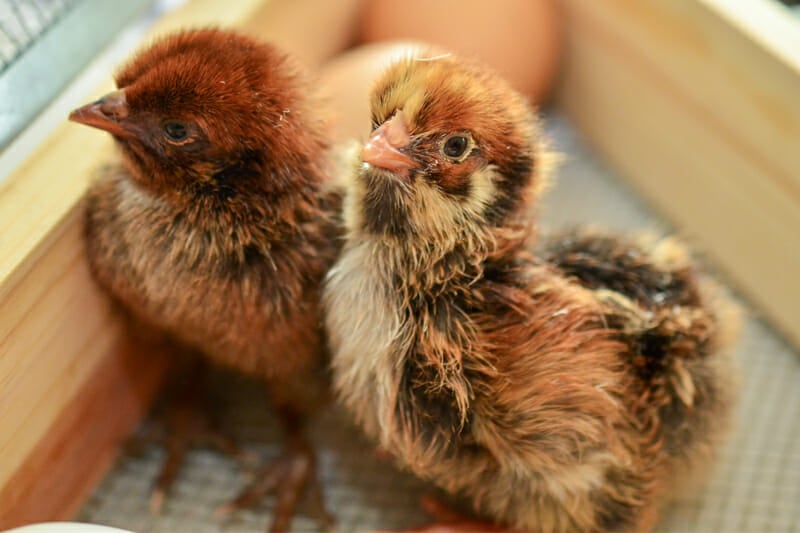
To avoid blood rings, do not attempt to hatch very dirty eggs; check your incubator temperatures; run a test run for several days before setting eggs; and make sure that all things the eggs come into contact with are clean.
Early Quitters (chicks lost in the first week)
Caused by improper incubator temperatures (usually too high), not turning the eggs, poor ventilation, or disease in the flock.
To avoid having early losses, again, do a test run so you know your incubator is running at the proper temperature, turn eggs at least 3 or 5 times a day (always in odd numbers), make sure that you have proper ventilation while avoiding drafts, and always hatch eggs from a healthy flock. I’ve had great luck calibrating my Brinsea Mini Advanced Incubator, but I know that this particular incubator is a decent-sized financial investment.
Pipped Without Hatching
Caused by low humidity, lack of ventilation, or malpositioned chicks. To avoid the chick’s body getting stuck in the egg, make sure your humidity levels are around 40-45% for the first 18 days and 60-65% during lockdown (unless you are doing a dry hatch), make sure there is adequate airflow in the incubator, and be sure to turn eggs up until lockdown and then hands off.
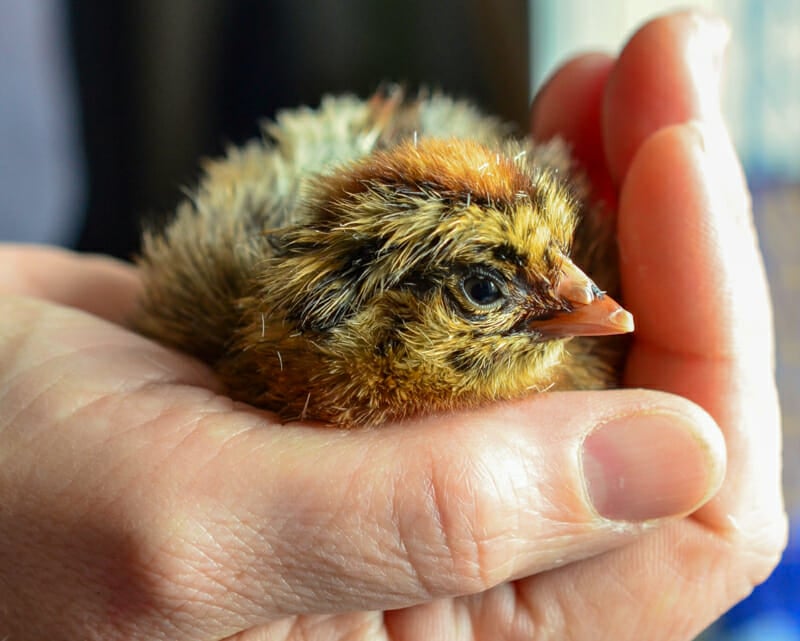
Not all losses are from human error. Sometimes you can do everything right and still have losses. Rarely do people get a 100% hatch success rate. We had one infertile egg, one blood ring, two early quitters, and one chick we lost at the hatch. I consider thirteen out of eighteen a successful hatch.
Frequently Asked Questions
Need some help raising those fluffy chicks?
Check out these guides for raising chicken chicks:
- How To Care For Laying Hens: A Beginner’s Guide to Everything
- Easily Fix Spraddle Leg/Splayed Legs with a Drinking Glass
- When is it Too Late to Fix Spraddle Leg?
- When to Switch Your Poultry’s Feed
- 5 Easy DIY Chick Brooders You Can Make from The Prairie Homestead
- Backyard Chickens 101 – Chick Care from Ever Growing Farm
- 5 Things Baby Chicks Need from A Farmish Kind of Life
If you’ve found value in this blog post and enjoyed reading it, why not share it with your Pinterest community? Pin the image below and spread the love!
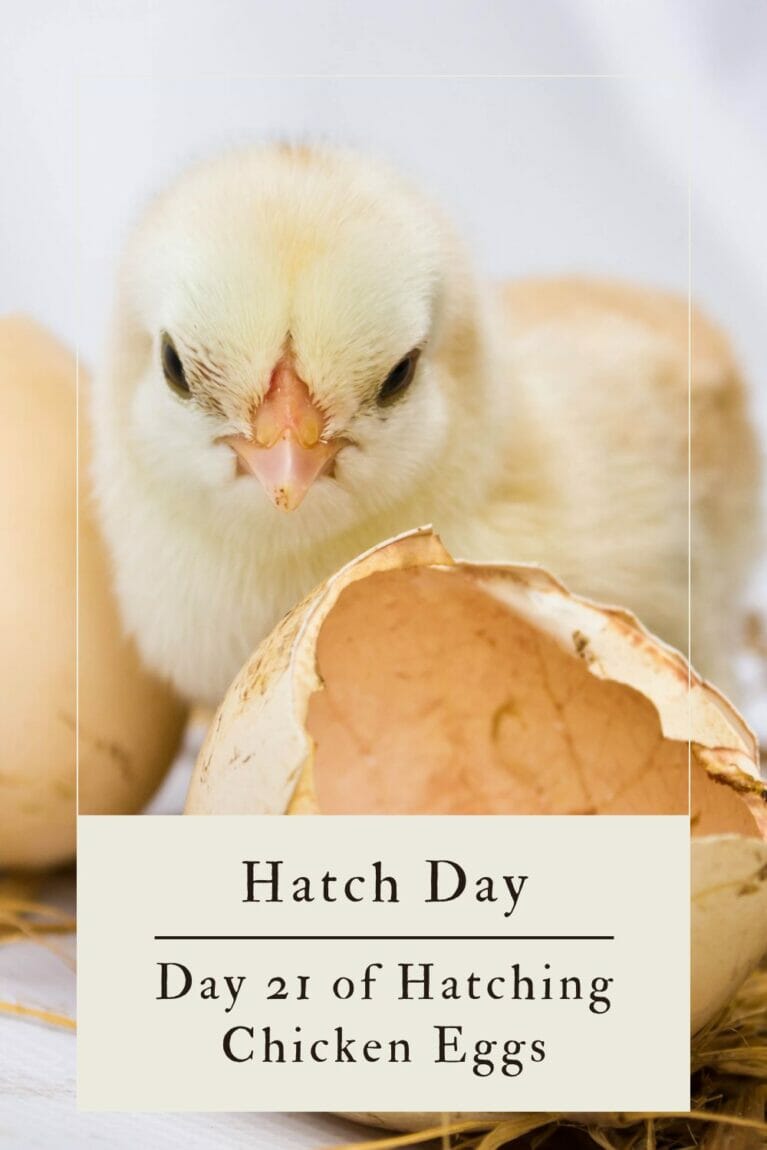
For anyone who loves chickens, hatching day is an exciting event that marks the end of weeks of careful planning and waiting. Even though the hatching process is not always predictable, knowing what to expect and how to get ready can greatly improve your chances of a successful hatch. Always keep in mind that the best way to let nature run its course is to be patient and not get in the way. If you know what to do and get ready, you can look forward to adding new fluffy chicks to your flock.
Have you ever had to intervene during a hatch? Share your story and any tips you have for first-time hatchers navigating this delicate process.
Happy hatching everyone!

I have a broody hen silkie sitting on 6 eggs right now. 4 are at day 19 and 2 she added a few days later so they are at day 16. I am a little worried that once the 4 hatch, she might abandon the other two that still have a few more days left. Should I move them to an incubator or will she still continue to sit on those until they hatch?
If I were you (and I’ve been there before), I’d have the incubator warmed and ready, but wait to see how she handles it. It seems 50/50 if they stay or leave.
We put 4 eggs in our MagicFly incubator, 3 have hatched and the 4th has a pipped hole, but the others are kicking it around like a soccer ball and right now it seems the pipped hole is facing downward. I’m concerned that if I open the incubator the drop in humidity will kill the chick that hasn’t hatched yet, but will being upside down be just as much as a concern? And, if I risk dropping the humidity to right it, won’t they just kick it around again? What to do, please?
I’m on day 24 only 4 chickens out of 36 have hatched the other eggs dont look like hatching what should I do
It was day 21 and nothing happened that we know of. We got up the next morning and there was a small hole a little smaller than a dime. The chick poked through both layers the blood membrane and eggshell. I’ts been about 6 hours later no movement or peeping. And no further progress on hatching could this mean the chick is dead?
We are day 21 of our Silkie eggs and nothing! I am flapping literally. What happened with your guys?
I am in same situation but no crack yet but they were peeping at ten am now hen abandon nest and eggs freezing please help
We have some chicken eggs that are past day 21 how long do I wait .
To day 25
25 days
Chicken raising is a very interesting job, I always try to understand the medicine for chickens. Chicken farming is my happiness.
good sharing I am from Rwanda and I do the same business of hatching chicken eggs by using incubator +250785068563
Hey there, I love this article. We just hatched out 29 of 41 eggs, wyndottes and aracanas, and super excited for our next round in the incubator. However my question is, What do I do with the eggs that never were? Do I compost them? Will they even compost with the veining present? Any help is appreciated, thanks!
Hello madam,I’m from fiji island and I don’t havedigital thermostat 220v. Please any idea from where I get one or can you sent me on my p o box box no 3718, labasa fiji island .I will pay you please .currently in using waterheater thermostat can’t control the temperature. Please Mam.
I washed my chicken eggs with water before I put them in incubator. Does that mean they won’t hatch?
No u might have just rubbed off a little of there protection but they will probably be fine
No not necessarily, it could cause the protective layer on it to come off and make it get bacteria in it and kill the embryos. But there is still a chance that the embryos will hatch.
We had a nest of duck eggs near our house, I looked this morning and saw some broken eggs, asuming a predator got to them, though there are 3 left from 11 eggs, should I leave them there or bring them in my house to see if they can hatch, thank you
J J
Hi. I have a Serema hen that has been broody for 21 days today. We have 8 eggs. I do not hear chirping or see any evidence of pipping. Should I be worried? She is very small and has been inside the entire time at a temp of 70.
If she’s still sitting then I wouldn’t worry. Hens will often abandon the nest if they decide the eggs aren’t viable. They may just be running a bit late.
Oh boy, am I ever jealous. We live on an old farm where they had an egg and milk business. We have a huge chicken coop and brooder house. Lovely buildings. The people voted to become a city, and now the city fathers won’t let anyone have chickens.Other small towns nearby allow chickens. Not ours.
Give those babies a hug from me, Jessica. I do love the names you pick.
Many people are working hard at overturning these ordinances. Often with a little homework and a chat at a town meeting you can get a few hens allowed. If this is something you are passionate about, feel free to send me an email and I’ll do anything I can to help.
While I’m not adventurous enough to have chickens, I wish I lived close to someone who did. FUN!
While it is definitely an adventure (and some days you think you’ve lost your mind) it’s a rewarding adventure. The fresh eggs, the constant antics and everyone running to you when you walk in the yard makes it all worth it.
Oh they are just precious!! Have fun naming them 🙂 I love how you describe them as ‘unzipping’ their eggs. Makes me imagine they are coming out of a sleeping bag.